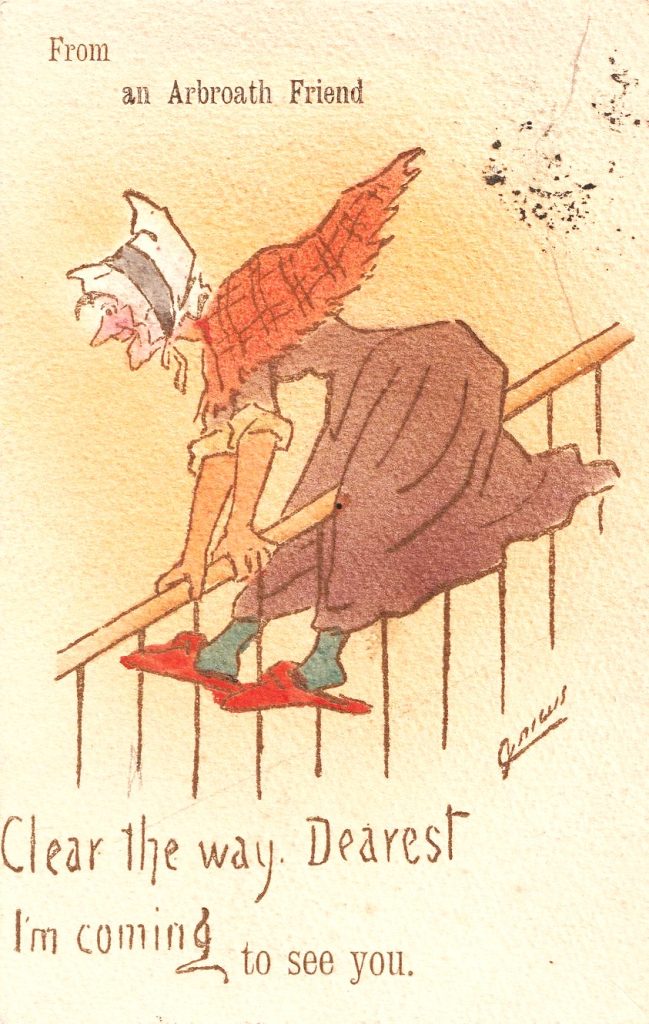Bob Teevan
An Arbroath Friend

The art on this simple postcard comes from the Scottish artist Martin Anderson, better known as Cynicus. Anderson’s art is quite enjoyable, although it is difficult to explain why. His art is distinctive and to an extent crude. Frequently, collectors will find themselves wondering if they have a Cynicus postcard or a homemade amateur watercolor.
This card is a perfect example. It is one that could have been drawn or painted without a high degree of technical ability.
It could be that the card is rare, for it appears to be a generic card published by the Cynicus Publishing Company for the retail customer who wants the opportunity to have the cards supplied and printed with the name of a local town. In this case, it is almost a certainty that the words “From an Arbroath Friend” are over-printed.
It would seem that the card was purpose-made to inform the recipient that they should expect a visitor and they should therefore “Clear the way, Dearest. I’m coming to see you.” Doesn’t it seem, almost, to be a warning?
The humor in the card is very much in the image. The text is in no way funny – actually it’s rather academic – although the image of what may be a fun-loving grandmother sliding down a banister could evoke smiles, even from the most ardent curmudgeon. Her motion is captured well by the billowing dress and shawl, and with a bit of imagination the viewer can almost hear her shouting, “Wheee!”
The card was mailed from Arbroath to Forfar (both in Scotland) on February 16, 1907. Mabel advises Bessie that “This is the way I come rushing down the stairs.”
Mabel’s advice is certainly carefree, yet sincere. We should all feel free to cast aside our inhibitions and slide down banisters for the sheer fun of it. But a caveat should be included to all those would-be banister riders, that they descend “bumbaleerie” first, because front facing encounters with newel posts are not recommended.
So, what’s your “bumbaleerie?”
“Bumbaleerie” (bum-bah-leary) is a word occasionally used by adults to describe a person’s posterior. (It still happens every day. People invent words to substitute for unpleasant or harsh sounding words. One American example, a favorite in the 1890s, may be to substitute “wheelbarrow” for the unpleasant, which was thought in some way to make understanding easier.)
In questioning if the word “bumbaleerie” was known to my friends, I learned that it was well known and is still commonly used by some. A search for the source of the word discovered that it was taken from a 1930s children’s rhyme, and was commonly used when repeatedly bouncing and catching tennis sized balls against a wall. The common words were –
| “One, two, three aleerie Four, five, six aleerie Seven, eight, nine aleerie Ten aleerie and catch the ball. |
One, two, three aleerie I saw Mrs. Peerie Sittin’ on her bumbaleerie Eatin’ chocolate babies.” |
The Scots Language Centre advises that “Aleerie is a very old word that means holding your leg crooked. You bounce a ball three times, then lift your leg and bounce the ball under it when you come to ‘Aleerie.’ The song was also used for skipping rope and other counting games, and it also has many variations.
It is not surprising how word usage migrates, especially in many Romance languages. The “Aleerie” rhyme is no exception.
A brief survey here at Postcard History discovered that the tune is fairly well known, but no one knew that it was part of a child’s game.
As an elderly Scottish lady now domiciled in Adelaide Australia I much appreciated this article and can remember the bouncing ball against the wall and the skipping Aberdeen Thank you
Growing up in New Jersey, USA, during the 1950s, I remember girls saying “1,2,3 Aleerie” while jumping rope and counting. I doubt if I ever wondered what it meant.
There is no Scottish in my background and don’t remember having Scottish friends as I bounced the ball and sang “One, two, three aleerie”
The word bummeleerie (note spelling) was known to refer to a “stupid fellow” at least as early as 1893.
Thanks. It would appear that both spellings are used and perhaps each is adopted in different parts of Scotland. Bummeleerie is most likely the purer version although ‘bumbaleerie’ – which probably caught on due to the sounding of ‘bumb’ – was the word used in my East of Scotland childhood. My father was from the East and my Mother from the West, so I can’t suggest which influenced my use of the word. Another word for the same part of the anatomy was ‘bahoochie’ (bah – hook – ey). We have some wonderful words in Scotland 🙂